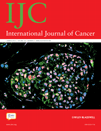Epigenetic inactivation of endothelin-2 and endothelin-3 in colon cancer†
Contributors: RW was responsible for the carcinogenicity bioassay and molecular studies; WMD assisted with the carcinogenicity bioassays, necropsies, and cell culture; CVL and KAF performed histopathology and immunohistochemistry; JAG assistance with invasion/migration assays; HA provided TMAs; EH, DEW, and MRD were responsible for critical revision of the manuscript; RHD provided the study concept, and was responsible for data interpretation and drafting/editing of the manuscript.
Abstract
Endothelin-1 (ET-1) and its receptors are overexpressed in human cancers, but much less is known about the roles of ET-2 and ET-3 in cancer etiology. We sought to examine human and rat colon tumors for dysregulation of ET-2 and ET-3 expression and determine the underlying mechanisms. Human primary colon cancers and carcinogen-induced rat colon tumors were subjected to real-time RT-PCR, immunoblotting and immunohistochemistry; EDN2 and EDN3 genes were examined by methylation-specific PCR, bisulfite sequencing and pyrosequencing; and forced expression of ET-2 and ET-3 was conducted in human colon cancer cells followed by real-time cell migration and invasion assays. Rat and human colon tumors had markedly reduced expression of ET-2 and ET-3 mRNA and protein compared with matched controls. Mechanistic studies revealed hypermethylation of EDN2 and EDN3 genes in human primary colon cancers and in a panel of human colon cancer cell lines. Forced expression of ET-2 and ET-3 attenuated significantly the migration and invasion of human colon cancer cells. We conclude that epigenetic inactivation of ET-2 and ET-3 occurs frequently in both rat and human colon cancers. Current therapeutic strategies target overexpressed members of the ET axis via small molecule inhibitors and receptor antagonists, but this work supports a complementary approach based on the re-expression of ET-2 and ET-3 as natural antagonists of ET-1 in colon cancer.
Abstract
What's new?
No protein is an island. Where one is askew, you'll often find others out of balance as well, and the group of interacting proteins and receptors known as the “endothelin axis” is no exception. These proteins are dysregulated in cancer development, and much study has focused on ET-1, which is increased in the disease cells. Less is known about ET-2 and ET-3, but the current paper reveals that these two proteins are shut down in rat and human colon cancer, and that boosting them may push back the disease by blocking ET-1.




